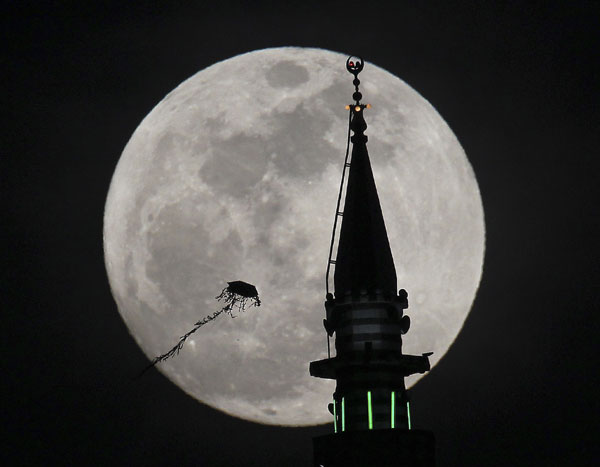|
 |
|
A resplendent moon silhouettes a mosque in Amman, the Jordanian capital, on Sunday (Beijing time). Sky watchers across the world enjoyed the perigee moon, when the celestial body is closest to Earth.??[Photo\Agencies] |
Stargazers across China enjoyed an exceptionally large full moon on Sunday while experts dismissed concerns that the astronomical phenomenon could cause natural disasters.
The over-sized moon was the result of a rare coincidence in which the moon becomes full at a time when it is at the point nearest to the Earth, or the perigee, said Zhang Yang, an expert from the Purple Mountain Observatory under the Chinese Academy of Sciences.
The moon becomes full every 29 and a half days and approaches the perigee on its elliptical orbit almost every 28 days, said Zhang.
"It takes years for the two astronomical phenomena to happen on the same day."
The moon was at the perigee at about 11:33 am on Sunday and was at its fullest at 11:35 am, with a gap of less than two minutes, said Zhang.
The moon was only 357,000 kilometers from the Earth at 11:35 am, 27,000 km less than the average distance, said Wang Sichao, a researcher of the same observatory, in a report by the Beijing News.
"The moon appeared to be 16 percent bigger than normal," Wang said.
Although the moon moved farther away from the Earth after 11:35 am, people in China were still able to view an enlarged full moon on Sunday night, Zhang said.
A similar event happened on March 19 last year, when the moon was as close as 356,000 km from the Earth, the closest encounter since 1992.
The "extreme super moon" caused discussion among Web users, some of whom believed it could lead to earthquakes and volcanoes.
"It is true the moon can cause some impact on Earth when it is nearest to the planet like today," said Zhang. "For example, the shape and composition of the Earth will change slightly, which may lead to geological changes."
When the moon is at the closest point, it produces a bigger impact on the planet, and this can cause changes in the shape and inner structure of the Earth in some places, Zhang said.
"However, such a change is very subtle and there has been no research to indicate it may cause an earthquake or volcanic eruption," Zhang added.
The moon could also bring about a higher tide on Sunday, but the change is not significant, Zhang said.
